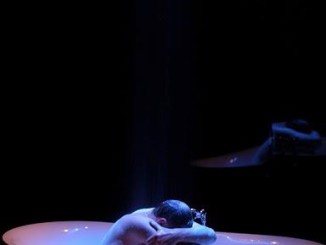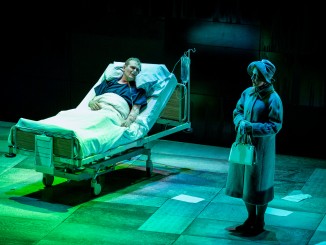What DOES it mean to be gay? [by Rosabel Tan]

You want a play to change you. You want it to take you by surprise, to delight you, to hurt you. You want it to whisper in your ear three days later when you’re trying to focus during a staff meeting about strategy and best practice. You want it to be meaningful, in whatever way it intends.
In his notes, Alexi Kaye Campbell explains that in writing The Pride, he was interested in the notion of gay identity. “In what it means to be gay in 2009 and how that definition was formed.” We’re presented with the same three characters, Sylvia (Dena Kennedy), Oliver (Kip Chapman) and Philip (Simon London) dealing with the issues of identity and love and betrayal in two parallel timelines: the first is in London in 1958, when homosexuality was a crime punishable by up to two years in prison. Sylvia, a former actress, has been illustrating one of Oliver’s children’s books and has invited him over for dinner. She’s desperate that her husband Philip – an uptight real estate agent – and Oliver get on, and it’s clear from the suffocating silences and stammering conversation that they will, though it won’t be an easy ride.
Flash-forward fifty years. Sylvia is a sassy best friend to Oliver, a journalist for the Daily Mail and forever wallowing in self-pity. His boyfriend, Philip, a photojournalist, has recently discovered that their entire relationship has been founded on a bedrock of sexual betrayal and has left him, and you want to empathise with his pain but he’s such an unlikable character that you don’t – and that’s an issue too, because the story of a love that daren’t speak its name is far more compelling than the story of a Dennis Cooper-esque love between a nice guy and a jerk. The juxtaposition between the two worlds is incredibly strange: Whereas the Oliver in the 1950s hears ethereal voices in the wind, assuring him that one day there will be an understanding of what has caused so many sleepless nights, the Oliver in the present day hears voices telling him he’s useless and to suck the dicks of strangers. When Philip pushes Oliver away in the present day, it’s because the latter is proud to be gay in a very different way, and one which muddies the morals of the play by shifting the source of pride from society to the individual: rather than being the victims of misfortune – of society’s ideals, of their love – they’re the victims of their own bad decisions, and it’s difficult to care in the same way.
Given Campbell’s comment that he wanted to show how personal lives are connected with wider social movements, it seems ludicrous that very little of the sociopolitical context is explored in the play: In 1958, Philip’s attempts to repress his sexuality are never called into question by any of the characters, despite the fact that this was a period characterised by exactly this – only a year earlier, The Wolfenden Report had called for the legalisation of homosexual acts, and though it took another ten years before this actually occurred, this was a decade where these conversations would have been happening. In 2008, on the other hand, it appears that the only issues faced by the characters are the occasional case of tokenism and Oliver’s sex addiction. In doing this, Campbell offers the audience an odd representation of what it means to be gay today: whereas in the fifties, people struggled to have pride in their sexuality, in the present day it appears to be about having a basic modicum of respect, both for yourself and the person you love.
That’s not to say it isn’t entertaining – it certainly has its moments, and it knows how to laugh at itself, and it’s rare that I feel this conflicted about a play, because while I have issues with the writing, the cast give marvellous performances: Kennedy imbues her Sylvia of the fifties with a raw and repressed loneliness that threatens to break your heart each time you catch a glimpse, while her Sylvia of the present day has a buoyant, magnetic energy that makes her every moment onstage a delight. Mirroring this contrast, London plays the tortured Philip of the fifties with devastating control, while his present-day Philip breathes with a more natural charm. Chapman’s Olivers are alternatively earnest and mild-mannered and simpering and asinine, and Sam Snedden is pitch perfect in his cameo roles as a Nazi role-playing prostitute, greasy magazine editor and clinician, roles that showcase his range and demonstrate how supporting characters can actually add to a play.
I hugely admire the choices Silo Theatre have made this year and I’ve enjoyed Top Girls and Tribes for very different reasons, but this one has left me a little confounded – and though it’s been a play that has kept whispering in my ear days later, I can’t quite make out what it’s saying.
The Pride is presented by Soloplays at the Herald Theatre till 1 September. Details see Silo.




Leave a Reply